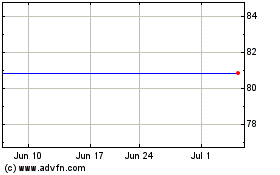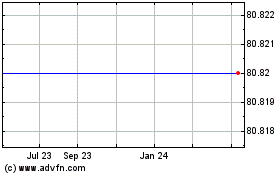Edwards Heart Valves Back On Center Stage At Heart Event
April 01 2011 - 11:24AM
Dow Jones News
The market potential for catheter-delivered heart valves will
come into focus this weekend when fresh data on Edwards
Lifesciences Corp.'s (EW) devices take center stage at the American
College of Cardiology's annual conference.
The event also will feature studies that could help determine
whether newer heart stents from Boston Scientific Corp. (BSX) and
Medtronic Inc. (MDT) reach the U.S., plus data on the
cost-effectiveness of Edwards' transcatheter valves.
The Edwards-funded "Partner" study already delivered favorable
results last year, showing patients with the company's Sapien-brand
valves died at a much lower rate after a year than patients who
received medical treatment but were too sick for regular valve
surgery. The bigger batch of data Sunday will directly compare
patients who either got Edwards' transcatheter valves or Edwards
valves installed through traditional, open-heart surgery.
It will take more than a year of data to fully vet the new
technology, but Edwards' study could still have a big impact.
"Depending on the results, this study could have substantial
ramifications" for patients, said Ralph Brindis, ACC's current
president, on a call with reporters. Brindis is a cardiologist with
Kaiser Permanente in California.
Sunday's data features frail patients with calcified, poorly
functioning aortic valves who are deemed high risks for surgery. If
patients with less-invasive, transcatheter valves survive a year at
the same rate as patients who had regular surgery, the data could
indicate the newer valves have an audience beyond patients who are
simply too sick for chest-cracking procedures.
Edwards' shares are up 72% over the past 12 months on
anticipation for the fast-growing, emerging device market.
"Positive data would significantly expand the patient
population, in our view, and support both approval of--and a
broader label for--the Sapien valve in the United States," William
Blair analyst Ben Andrew said.
The study will also have bearing for current Edwards valve
competitor Medtronic, plus Boston Scientific Corp. (BSX), Johnson
& Johnson (JNJ), St. Jude Medical Inc. (STJ) and other
companies eying the market. Edwards and Medtronic split an
international trascatheter-valve market worth about $400 million in
sales last year, but analysts anticipate rapid growth to
multi-billion-dollar size in coming years.
Edwards has the lead in seeking U.S. approval, which could come
later this year based on an already filed Food and Drug
Administration application pegged to the prior data. The company
plans to file another application soon based on this new data.
While the first application only covered a delivery system used to
thread valves up from the groin, the new application will also
cover a tool used to pass valves through an incision between the
ribs.
Edwards expects to charge about $30,000 for Sapien valves in the
U.S. Surgically implanted valves cost around $5,000 to $7,000.
Analysts broadly expect the study to meet its main goal of
matching surgery's one-year mortality rate, but they will be
closely scrutinizing the degree of success along with measures on
strokes and other complications. An unexpectedly high stroke rate
for valve-treated patients in the study's other arm raised eyebrows
last year.
Madison Williams analyst Spencer Nam sees a "strong possibility"
the new data will top Wall Street's expectations. RBC Capital
Market's Glenn Novarro, on the other hand, cautioned stroke rates
are "likely to cause a concern."
Elsewhere at ACC, Medtronic and Boston Scientific will have new
data aimed at supporting U.S. applications for newer drug-coated
stent offerings. The tiny artery scaffolds use medication to slow
renarrowing and cost around $1,500 to $2,000 each, but have been
under significant price pressure for several quarters amid tight
competition.
For Boston Scientific, the "Platinum" study is aimed at getting
the company's "Promus Element" stents approved in the U.S. in
mid-2012. This is important because Boston Scientific will lose
access then to an older version of Promus made by Abbott
Laboratories (ABT). Getting the new, home-grown version in the U.S.
will help Boston Scientific's profitability.
Fresh data from studies on Medtronic's "Resolute" stent,
meantime, are aimed at helping get that device approved in the U.S.
early next year. The company never gained major U.S. traction with
an older stent called Endeavor, which has trailed stents from
Abbott and Boston Scientific.
-By Jon Kamp, Dow Jones Newswires; 617-654-6728;
jon.kamp@dowjones.com
SJM (NYSE:STJ)
Historical Stock Chart
From Jun 2024 to Jul 2024

SJM (NYSE:STJ)
Historical Stock Chart
From Jul 2023 to Jul 2024
